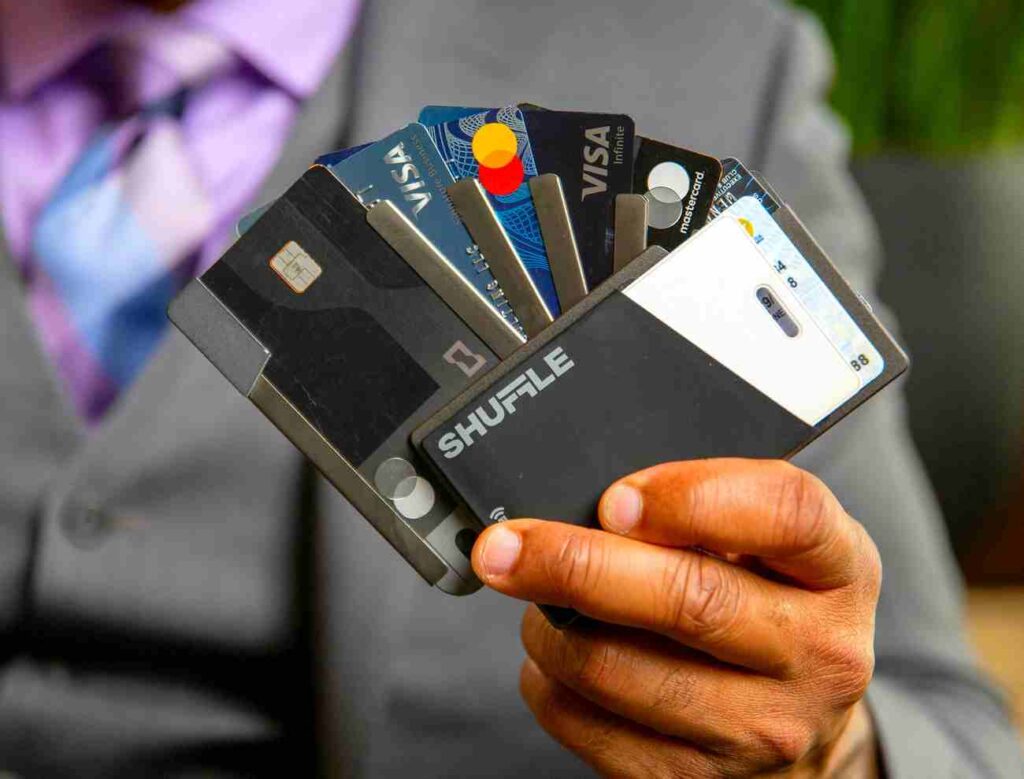
Credit Card Beginner Guide Credit Card Starter Guide
This guide provides an overview of Credit cards for beginners. Opening and managing credit cards responsibly is crucial to building your credit history, which impacts your eligibility and future loan rates.
What Is a Credit Card?
A credit card lets you borrow money to buy stuff. It comes with some costs (like interest and fees) but also some benefits (like rewards and building your credit). You borrow from the bank to buy things, whether it’s a quick bite to eat or a flight to France. Every month, you get a statement showing what you spent, and then you pay it back. You can pay it all at once, or just pay part and carry over the rest. If you carry a balance, you’ll have to pay interest on what you owe, which is a percentage of the amount you borrowed. lets discuss the Credit Card Beginner Guide | Credit Card Starter Guide
Credit Card Pros and Cons
| PROS | CONS |
|---|---|
| You can buy something big now and pay it off in smaller chunks over time. | It’s easy to rack up debt if you’re not careful with your spending. |
| Carrying a credit card is way more convenient (and safer) than carrying a bunch of cash, and they’re accepted almost everywhere, way more than personal checks. | Credit cards are so easy to use that you might end up spending more than you intended. |
| If you use it responsibly, you can build your credit, which will be super useful down the line. | Missing payments or maxing out a card can really hurt your credit score fast. |
| Lots of credit cards give you rewards, basically giving you back 1% or more of what you spend. | Interest can turn a small debt into something much bigger over time. |
Credit Card Beginner Guide Credit Card Starter Guide
When choosing a credit card, ask yourself: Am I going to carry a balance and pay interest?
Pay your Credit Card Balance
If you pay off your credit card balance in full and on time each month, you won’t pay any interest. In that case, it makes sense to get a card that gives rewards, as long as you have the credit score to qualify. (Basically, the higher your credit score, the better the cards you can get.) Rewards cards give you points, cash, or miles every time you use them. The best reward rates, coolest perks, and lowest interest rates are for those with excellent credit.
Do Carry a Balance
If you usually carry a balance (meaning you don’t pay off the full amount each month), you’ll want a card with a low interest rate to save money on interest.
Your card comes from a bank, like Bank of America®, Chase, or Wells Fargo. The bank decides your rate, fees, and rewards, so it’s worth picking one that offers what you need.
When you use your card, the payment goes through a network like Visa, Mastercard, or American Express. That network decides where your card works. Some extra perks — like free rental car coverage or phone protection — might come from the payment network, not just the bank.
ProTip:
Credit cards that earn rewards usually come with higher interest rates. If you’re carrying a balance each month, the interest could cancel out any rewards you’re earning.
Interest payments and fees
Credit card companies make money in a few main ways:
- They charge a fee to stores every time you swipe your card.
- They earn interest if you don’t pay off your full balance.
- They collect fees, like late fees or yearly fees.
You don’t need to stress about the first one — stores pay that, not you. What you do need to watch are interest charges and extra fees.
Most credit cards come with different fees — like annual fees, cash advance fees, or late payment charges. Usually, cards with no annual fee are pretty common, unless you’re getting big rewards or have low credit.
But here’s the deal: Always try to pay at least the minimum on time. If you don’t, you could get hit with late fees, a higher interest rate, and it could even hurt your credit score.
And if you’re using a rewards card, keep this in mind — carrying a balance means interest will cancel out your rewards. So if there’s a chance you won’t pay off your card in full each month, it’s better to skip rewards cards and go for something with lower interest instead.
Costs of a credit card
When you apply for a credit card, you’ll see a chart called a Schumer box. It’s there to show you the key details about the card in a clear way. Here’s how to read it:
APR for Purchases:
This is the interest rate you’ll pay on anything you didn’t fully pay off from the last month. It’s charged daily, not yearly. So if your APR is 15%, you’re actually paying around 0.041% per day.
Some cards offer a 0% intro APR for a few months — sometimes six or more — to get you started. It’s a great way to buy something big now and pay it off later without paying extra interest.
APR for Balance Transfers
Got credit card debt? You can move it to a new card — that’s called a balance transfer. Some cards let you move your debt and pay no interest on it for a while, usually 6 to 12 months or more. Others charge the same interest rate as normal purchases.
Heads-up: Most cards charge a one-time fee (usually a percentage of the amount you move) when you do a balance transfer.
APR for Cash Advances
If you use your credit card to get cash from an ATM or bank, that’s a cash advance — and it comes with higher interest. Unlike normal purchases, you don’t get a grace period — interest starts right away from the day you take the cash.
Penalty APR
If you miss a payment, your card might hit you with a much higher interest rate — called a penalty APR — and it can last for up to six months.
How to Avoid Paying Interest
This part tells you about your grace period — the time between your billing date and due date. If you pay off your full balance during that time, you won’t be charged any interest.
Minimum Interest Charge
Even if your actual interest comes out low, like a few cents, some cards have a minimum charge. So, for example, if you owe 0.01 in interest, the card might still charge you 0.50 just because that’s the minimum.
Penalty Fees and Rates
- Late Payment Fee:
If you don’t pay at least the minimum amount by the due date, you’ll get hit with a late fee. And if you’re over 30 days late, it can hurt your credit score too. Learn about credit scores, - Over-the-Limit Fee:
If you spend more than your card limit, the card company might still let it go through, but they can charge you a fee for it. This only happens if you’ve opted in for over-limit coverage — so it’s pretty rare. - Returned Payment Fee:
If your payment bounces (like a bad check or a failed bank transfer), you’ll get charged a returned payment fee. - Best Credit card with no annual fee.
Rewards Program Info
If you’ve got a rewards card, this section explains how you earn and use your rewards. Be sure to read it — some programs are awesome and let you get cash back, free travel, or cool stuff.
But not all are great — some offer tiny rewards, or only let you redeem for lame items or gift cards you don’t want. So check the details before you get too excited.
Just Getting Started with Credit?
To get the top credit cards, you usually need good or excellent credit. That means high rewards and low interest rates aren’t usually an option if you’re just starting out — whether you’re working or still in school. First, you’ve got to build your credit. Here are a few ways to do that:
✅ Option 1: Secured Credit Card
A secured card needs a cash deposit, usually the same amount as your credit limit. It’s like insurance for the card company in case you don’t pay. These are easier to get, if you have no credit history, but you’ll still need to show some income. Learn How secured cards
✅ Option 2: Student Credit Card
These are made for students with little to no credit. But just being in college isn’t enough. If you’re under 21, you’ll need to prove you have your own income. If you’re 21 or older, you can count money you have access to, like from a partner or family.
✅ Option 3: Become an Authorized User
You can get added to someone else’s credit card account, like a parent’s. You get your own card to use, but they’re the one responsible for paying. If the card company reports your activity, it can help you build your credit too.
✅ Option 4: Get a Co-Signer
A co-signer (like a parent or friend) agrees to pay your card bill if you don’t. Some credit card companies allow co-signers, but not all do.
Building credit takes time, but starting with the right card — whether it’s secured, student-based, or with someone’s help — can set you on the right path. Use your card wisely, pay on time, and watch your credit grow!
Credit Card Beginner Guide Credit Card Starter Guide, Credit Card Beginner Guide Credit Card Starter Guide, Credit Card Beginner Guide Credit Card Starter Guide, Credit Card Beginner Guide Credit Card Starter Guide, Credit Card Beginner Guide Credit Card Starter Guide, Credit Card Beginner Guide Credit Card Starter Guide, Credit Card Beginner Guide Credit Card Starter Guide, Credit Card Beginner Guide Credit Card Starter Guide, Credit Card Beginner Guide Credit Card Starter Guide, Credit Card Beginner Guide Credit Card Starter Guide, Credit Card Beginner Guide Credit Card Starter Guide, Credit Card Beginner Guide Credit Card Starter Guide, Credit Card Beginner Guide Credit Card Starter Guide, Credit Card Beginner Guide Credit Card Starter Guide, Credit Card Beginner Guide Credit Card Starter Guide, Credit Card Beginner Guide Credit Card Starter Guide, Credit Card Beginner Guide Credit Card Starter Guide, Credit Card Beginner Guide Credit Card Starter Guide, Credit Card Beginner Guide Credit Card Starter Guide, Credit Card Beginner Guide Credit Card Starter Guide
Credit Card Beginner Guide | Credit Card Starter Guide, Credit Card Beginner Guide | Credit Card Starter Guide, Credit Card Beginner Guide | Credit Card Starter Guide
Credit Card Beginner Guide | Credit Card Starter Guide, Credit Card Beginner Guide | Credit Card Starter Guide, Credit Card Beginner Guide | Credit Card Starter Guide Credit Card Beginner Guide | Credit Card Starter Guide, Credit Card Beginner Guide | Credit Card Starter Guide, Credit Card Beginner Guide | Credit Card Starter Guide Credit Card Beginner Guide | Credit Card Starter Guide, Credit Card Beginner Guide | Credit Card Starter Guide, Credit Card Beginner Guide | Credit Card Starter Guide

